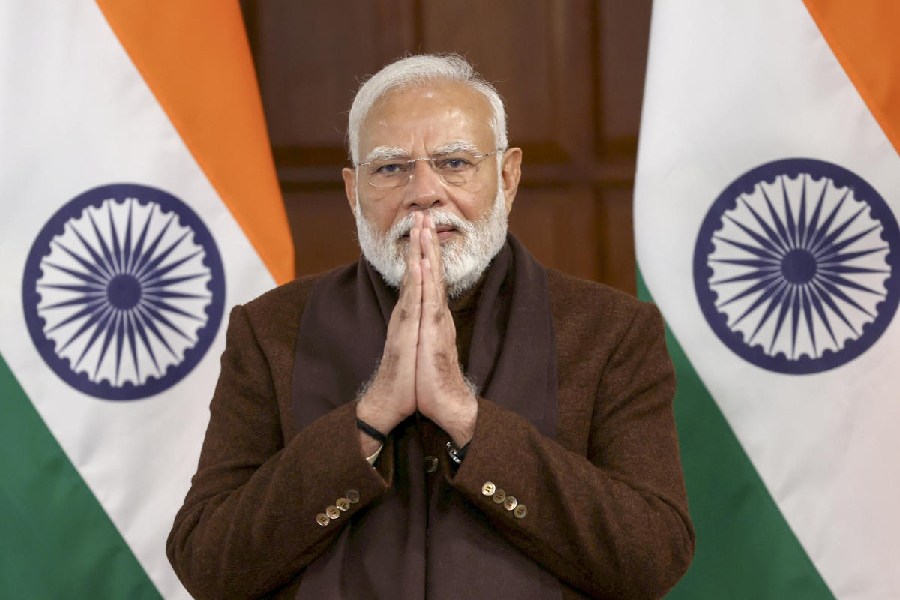The government spent more than ₹62 crore in the last three years on Pariksha Pe Charcha, an annual event in which Prime Minister Narendra Modi advises schoolchildren on exam preparedness.
These three years also saw the suspension of a scholarship awarded to schoolchildren — up to their doctoral programmes — through the National Talent Search Examination. The education ministry has asked the National Council of Educational Research and Training (NCERT) to put the exam on hold.
Had the scholarship been continued, the total expenditure on it across these three years would have come to less than ₹40 crore, going by the spending pattern from previous years. Some government officials suggested the Centre had suspended the Talent Search Exam as part of a plan to cut its expenses on scholarships.
Several academics and parents questioned the Centre’s priorities, saying Pariksha Pe Charcha (PPC) was little more than a repetitive “public relations” and “self-glorification” exercise on the part of the Prime Minister whereas the scholarship could really have helped the students.
The PPC is held in January or February at a venue in Delhi where pupils from various states and schools are brought. Modi responds to select (pre-screened) questions from the audience — and some pre-recorded ones. The education ministry bears
the expenses.
Expenditure figures for the first PPC (in 2018) were unavailable but the total spend on the next six has been ₹78.83 crore, with the expenses across the last three years coming to ₹62.20 crore. (See chart)
In 2022-23, the programme involved extra costs for printing and sending appreciation letters on the Prime Minister’s letterhead to the about 38 lakh “participants” who had registered themselves on the PPC portal and watched the
event online.
Data and documents accessed by The Telegraph under the RTI Act show that the National Book Trust, the agency entrusted with this task, had estimated the cost at about ₹28 crore. This was in addition to the ₹10 crore spent on the conduct of the event.
In 2023-24, the government sent the appreciation letters online, saving on costs. Yet that year’s expenses reached ₹16 crore.
Rajesh Jha, a faculty member at Delhi University-affiliated Rajdhani College and the father of a schoolgirl, said the National Talent Search was the most sought-after scholarship for schoolchildren, encouraging enrolment in higher studies and boosting their confidence apart from the monetary help.
“Any compromise with it is detrimental to excellence and innovation in the field of education,” he said.
The scholarship was started in 1963 to identify and nurture talent. The exam is held in two stages — an elimination round held by the individual states followed by an NCERT-conducted national test for the final selection of 2,000 scholarship awardees. Only Class X pupils can take the test, and the successful children are eligible to receive the scholarship till they complete their PhD.
Each scholarship holder gets ₹1,250 a month in Class XI and XII, and ₹2,000 a month at undergraduate and postgraduate levels. The stipend at the PhD level is the same as that provided by the University Grants Commission’s Junior Research Fellowship: an average ₹37,500 a month for
five years.
The Centre has been sitting on the report of a committee that suggested changes to the scholarship scheme, including the introduction of separate rural and urban quotas — depending on the population breakup per district — to nullify what it saw as the exam’s urban bias.
“The PPC has been reduced to a public relations exercise. The government is talking about reducing exam stress, but it is increasing the students’ stress by adding centralised entrance tests,” Jha said.
Ashok Agrawal, chairperson of the All India Parents Association, said: “It’s very unfortunate that you are spending on a self-glorification event (for the Prime Minister) like PPC but discontinuing the Talent Search. Modi has already penned his thoughts for children in his book, Exam Warriors. The same ideas are repeated every year at the PPC.”
Agrawal questioned the government’s commitment to mass education, saying schools still lacked basic infrastructure 15 years after the implementation of the Right to Education Act.
After the last Talent Search Examination (for the year 2020-21) was held in October 2021, the NCERT in December that year put out a notice saying the exam for 2021-22 had been postponed for administrative reasons. Since then, there has been no word on the subject.
In 2021, the government had asked the NCERT to review the scheme and suggest changes. The review committee handed in its report in September 2022, saying the influence of coaching had blighted the programme’s objective of identifying real talent.
An email was sent on January 3 to school education secretary Sanjay Kumar seeking the reasons for the increased expenditure on the PPC amid the continuing suspension of the Talent Search Examination. His response is awaited.











